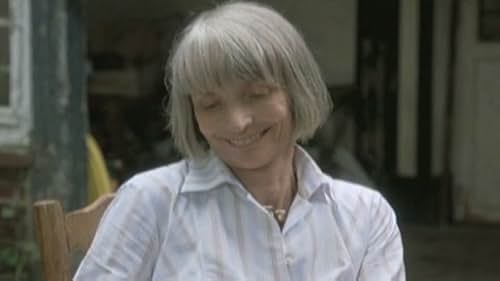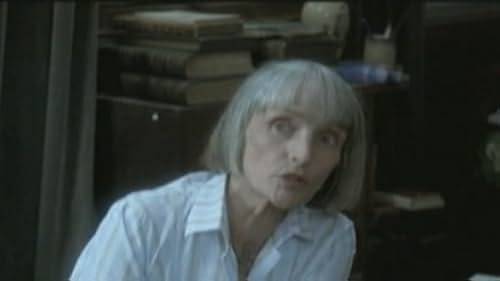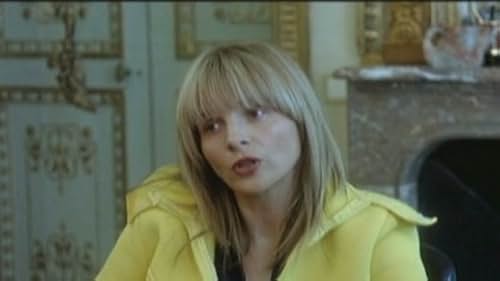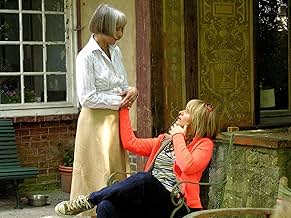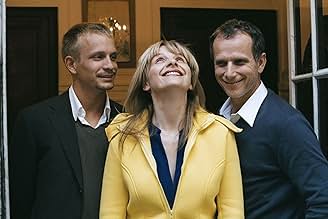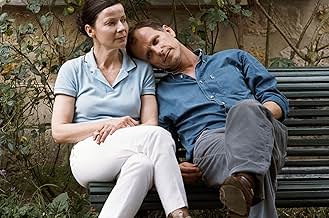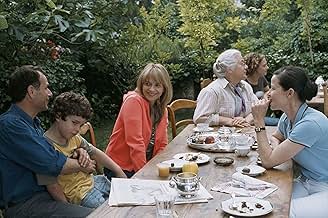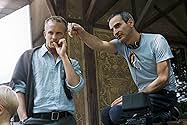IMDb RATING
7.1/10
8.4K
YOUR RATING
Two brothers and a sister witness the disappearance of their childhood memories when they must relinquish the family belongings to ensure their deceased mother's succession.Two brothers and a sister witness the disappearance of their childhood memories when they must relinquish the family belongings to ensure their deceased mother's succession.Two brothers and a sister witness the disappearance of their childhood memories when they must relinquish the family belongings to ensure their deceased mother's succession.
- Awards
- 9 wins & 23 nominations total
- Director
- Writer
- All cast & crew
- Production, box office & more at IMDbPro
Featured reviews
A film about talented rich people squabbling, albeit very gently, about an inheritance would normally be a candidate to make my hackles rise. But 'Summer Hours' is a sensitive, subtle movie, that explores non-judgmentally what is important to us, and why: in short, how we define our emotional identities. The characters seem likable, but display an ordinary selfishness, and the film lightly samples the passions that make each of them tick. It's a very wordy movie, so much so, it could almost have been a stage play, but the director has a great sense of place, evoking his characters own feelings for place and the movie never feels heavy. In one sense, the ending is a touch underwhelming; but in keeping with the film's overall style. I liked it, a lot: the sort of film that only the French seem to make.
SUMMER HOURS (L'heure d'été) is more of a reverie than a story for a film. This very French film touches the subject of family - the meaning and influence and contradictions - in an examination of coping with the death of the matriarch and her wishes versus the intentions of the siblings. Writer/Director Olivier Assayas seems less interested in allowing the viewer to get to know the individuals of the story than he is with conveying the vacuum of death and the aftermath of dealing with it in the setting of a family of grown children.
The film opens as it closes - in summer with scenes awash with French countryside living. Three children have gathered with their families for the 75th birthday of their mother, the elegant and wistful Hélène (Edith Scob) whose adoration of her famous painter uncle presses on her mind as she senses her own mortality. One son, Frédéric (Charles Berling) is her confidant in hearing her wishes about the dispersal of the house and furniture and art that mean so much to her. Her other son Jérémie (Jérémie Renier) has traveled from his new home in China where his tennis shoes company has stationed him: his fondness for his mother is apparent but his need for financing makes him view the wishes of his mother in a more practical light. Her daughter Adrienne (Juliet Binoche) has traveled from her preferred new home in New York City and views the wishes of her mother with a similar practical and somewhat distant stance.
Some time later the mother dies and the children gather for the funeral and for the discussion of what to do with the 'inheritance'. The interplay between the sentimental Frédéric and the pragmatic Adrienne and Jérémie bring about questions of placing the art and furniture with museums and the selling of the house of their youth. Gentle undertones of sibling relationships and questions about the quality of memorabilia versus the practicality of getting on with living provide the final movement. The film ends in a coda that returns the younger generation (Hélène's grandchildren) to the beauty of the gardens of the now empty French house. The thread that holds the film together is the presence of the longtime housekeeper Éloïse (Isabelle Sadoyan), the gentle being that understands it all.
Though the film is beautifully acted and photographed there is very little development of the various characters, a fact that leaves the viewer with the feeling of simply peeking through a windowpane to watch a French family walk through a moment in life and in death. Nothing much happens here: the film is more a reverie, but a very beautiful one to relax and enjoy. Grady Harp
The film opens as it closes - in summer with scenes awash with French countryside living. Three children have gathered with their families for the 75th birthday of their mother, the elegant and wistful Hélène (Edith Scob) whose adoration of her famous painter uncle presses on her mind as she senses her own mortality. One son, Frédéric (Charles Berling) is her confidant in hearing her wishes about the dispersal of the house and furniture and art that mean so much to her. Her other son Jérémie (Jérémie Renier) has traveled from his new home in China where his tennis shoes company has stationed him: his fondness for his mother is apparent but his need for financing makes him view the wishes of his mother in a more practical light. Her daughter Adrienne (Juliet Binoche) has traveled from her preferred new home in New York City and views the wishes of her mother with a similar practical and somewhat distant stance.
Some time later the mother dies and the children gather for the funeral and for the discussion of what to do with the 'inheritance'. The interplay between the sentimental Frédéric and the pragmatic Adrienne and Jérémie bring about questions of placing the art and furniture with museums and the selling of the house of their youth. Gentle undertones of sibling relationships and questions about the quality of memorabilia versus the practicality of getting on with living provide the final movement. The film ends in a coda that returns the younger generation (Hélène's grandchildren) to the beauty of the gardens of the now empty French house. The thread that holds the film together is the presence of the longtime housekeeper Éloïse (Isabelle Sadoyan), the gentle being that understands it all.
Though the film is beautifully acted and photographed there is very little development of the various characters, a fact that leaves the viewer with the feeling of simply peeking through a windowpane to watch a French family walk through a moment in life and in death. Nothing much happens here: the film is more a reverie, but a very beautiful one to relax and enjoy. Grady Harp
Hélène Berthier, niece of a famous painter, receive her children and grand children for her birthday, and take this opportunity to talk about her death, and what will happen to her uncle's collection. Once dead, Frederic, her elder son think that they'll keep the house as it his, but his brother and sister don't live in France anymore and think that it would more intelligent to sell. When I was expecting the family to be destroyed around this heritage, nothing like that happens, they all accept and the rarity in the 21 century of families having things that could belong to museums takes an end. This film is extremely beautiful, for many reasons. First because it can touch everyone who lost someone and saw what was theirs, being sold and put in many places. Then this film is beautiful because it shows also how everyone accepts that but also suffers from what they can't keep together: family, past, heritage! To me it shows better than any Amelie, or La Vie en Rose what being French means: being thorn between the heritage of a culture and an appeal of modernity, wanting to keep your roots alive and spread toward the world. This is funny how this thought came through my mind "Why do they want to live in Beijing or New York?" suddenly being in the film, that seemed weird to me when I just lived two years and a half in London, and probably won't stay in my old country forever. The actors are great, Edith Scob playing the extremely classy Hélène, and Charles Berling, Jeremy Regnier and Juliette Binoche are very touching and human. It's important to say, that the object are also characters in this story, and it's scary at the end to see them in the museum d'Orsay, how they lost life or are recovering some. It's important to say that this film was a project with the museum, and I think that it is brilliant to make us pay attention to the details of these objects when generally we're not. Question: is art made for museum or to live with it? People wouldn't try to steal them from museum if the answer was museums
If you want to see my other critics: http://www.silverparticules.blogspot.com
Three adult siblings must decide what to do with their mother's house and collection of valuable art after her death in this melancholy but quite lovely film from Olivier Assayas.
"Summer Hours" really struck a chord with me, because I've just recently begun to see the results of aging in my own parents and am beginning in a real rather than abstract way to prepare myself for a time when I will not have them in my life. The film does wonders at conveying this particular family dynamic with very few moments of outright exposition; the first scene especially, a family gathering while the mother is still alive and wants to inform her children about what to do with her things when she passes, is a marvel of subtle nuances in both the writing and acting that clearly communicates the differences in the relationships between the mother and her three children. The oldest brother doesn't want to think about his mother's death in advance and wants to hold on to things after she's gone; the two younger children, living in different parts of the world, want to be rid of things as quickly and cleanly as possible. Yet the movie doesn't pass judgement on any of them, doesn't treat the oldest brother as a sentimental fool, nor the younger siblings as callously indifferent. It simply acknowledges the complexity of emotions involved in dealing with inanimate objects that represent years of a flesh-and-blood relationship.
Grade: A
"Summer Hours" really struck a chord with me, because I've just recently begun to see the results of aging in my own parents and am beginning in a real rather than abstract way to prepare myself for a time when I will not have them in my life. The film does wonders at conveying this particular family dynamic with very few moments of outright exposition; the first scene especially, a family gathering while the mother is still alive and wants to inform her children about what to do with her things when she passes, is a marvel of subtle nuances in both the writing and acting that clearly communicates the differences in the relationships between the mother and her three children. The oldest brother doesn't want to think about his mother's death in advance and wants to hold on to things after she's gone; the two younger children, living in different parts of the world, want to be rid of things as quickly and cleanly as possible. Yet the movie doesn't pass judgement on any of them, doesn't treat the oldest brother as a sentimental fool, nor the younger siblings as callously indifferent. It simply acknowledges the complexity of emotions involved in dealing with inanimate objects that represent years of a flesh-and-blood relationship.
Grade: A
Up until now, you may have seen films that are told through the eyes of a specific character, a child or even a dog. However this film achieves the impossible, it tells the story of generations through the eyes of the objects! The film opens with a large family gathering in a gorgeous old house located in French countryside. The house lies in the middle of a large garden and hosts beautiful antique furniture the owner, mother of three middle aged children, inherited from her uncle. A year later, she dies and the children have to decide about the fate of the house and the furniture.
Anyone who has lost a parent or an elder family member possibly has gone through these difficulties depicted so naturally in the film. However, the movie goes beyond the initial thoughts and feelings. Delicate questions asked by this movie are multifaceted and explore the effects of capitalist globalization on generations.
Those objects have memories in them. When they are left to a museum, they seemingly belong to the society as whole but to no one at the same time.
The elder brother, professor of economy, who lives in France wants to preserve the house, he wants to stick to his roots, to family memories but his brother and sister want to follow their careers in China and US. Yes, by doing so they live in the moment and yes, they are not confined to France and yes, the whole world is theirs but they are also left with nothing. Like objects displayed in the museum.
And this duality lives on until the ironic ending, which can be interpreted as optimistic or pessimistic by viewers even tough pessimistic tone is definitely more prevalent.
Beautiful acting by Binoche, Charles Berling, Edith Scob and wonderful directing and writing by Assayas. This movie is just lifelike, simple but complex!
Anyone who has lost a parent or an elder family member possibly has gone through these difficulties depicted so naturally in the film. However, the movie goes beyond the initial thoughts and feelings. Delicate questions asked by this movie are multifaceted and explore the effects of capitalist globalization on generations.
Those objects have memories in them. When they are left to a museum, they seemingly belong to the society as whole but to no one at the same time.
The elder brother, professor of economy, who lives in France wants to preserve the house, he wants to stick to his roots, to family memories but his brother and sister want to follow their careers in China and US. Yes, by doing so they live in the moment and yes, they are not confined to France and yes, the whole world is theirs but they are also left with nothing. Like objects displayed in the museum.
And this duality lives on until the ironic ending, which can be interpreted as optimistic or pessimistic by viewers even tough pessimistic tone is definitely more prevalent.
Beautiful acting by Binoche, Charles Berling, Edith Scob and wonderful directing and writing by Assayas. This movie is just lifelike, simple but complex!
Storyline
Did you know
- TriviaThis film is part of the Criterion Collection, spine #513.
- GoofsGrandmother's two most valuable objects, the Corots, are hung where they'll both get lots of sunlight, guaranteed to damage the colors. Since once gets the definite impression that little in the house has changed over many years, these pictures would be toast by now.
- SoundtracksLoftus Jones
Written by Turlough O'Carolan
Performed by Robin Williamson, Mat Maneri and Barre Phillips
- How long is Summer Hours?Powered by Alexa
Details
- Release date
- Country of origin
- Official sites
- Languages
- Also known as
- Las horas del verano
- Filming locations
- La Saglière, rue des Rayons, Butry-sur-Oise, Val-d'Oise, France(the Berthiers' house)
- Production companies
- See more company credits at IMDbPro
Box office
- Budget
- €4,400,000 (estimated)
- Gross US & Canada
- $1,657,001
- Opening weekend US & Canada
- $49,484
- May 17, 2009
- Gross worldwide
- $7,835,857
- Runtime1 hour 43 minutes
- Color
- Sound mix
- Aspect ratio
- 1.85 : 1
Contribute to this page
Suggest an edit or add missing content




